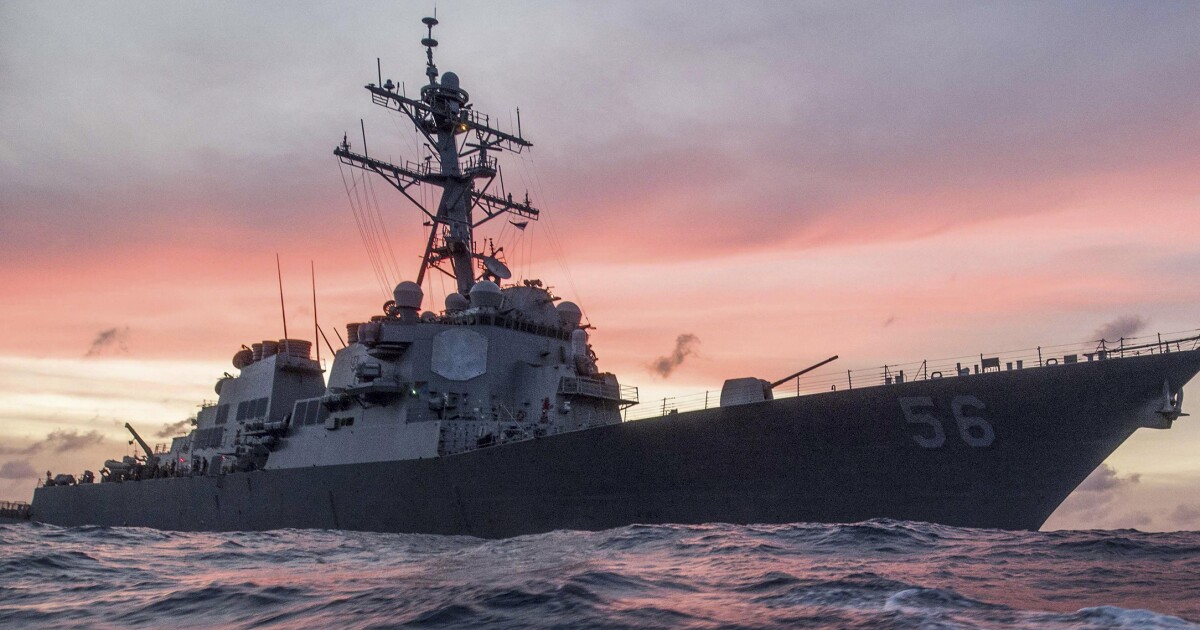

The Chinese military’s unsafe intercepts of U.S. Air Force aircraft and Navy vessels have occurred “more frequently than we’d like,” White House National Security Council coordinator John Kirby said.
There have been two unsafe intercepts in the last couple of weeks, according to U.S. defense officials. A Chinese military aircraft flew in front of a U.S. Air Force RC-135 over the South China Sea, causing the U.S. aircraft to jostle as it flew through its wake turbulence. U.S. Indo-Pacific Command described it as “an unnecessarily aggressive maneuver,” while more recently, a Chinese navy vessel crossed in front of the USS Chung-Hoon and HMCS Montreal twice and forced them to slow down to avoid a collision.
NEWSOM’S LATEST BUDGET RECEIVES PUSHBACK FROM LOYAL LAWMAKERS
“Air and maritime intercepts happen all the time. Heck, we do it,” Kirby told reporters at Monday’s White House briefing. “The difference is, when we do it, when we feel like we need to do it, it’s done professionally. And it’s done inside the inner international law. And it’s done in accordance with the rules of the road. These two that you saw recently … they have happened with more frequency than we’d like. Not all of them are unsafe and unprofessional.”
“We’re flying or sailing, we’re operating in international airspace and international waters, and both of those incidents were in complete compliance with international law. There was absolutely no need for the [People’s Liberation Army] to act as aggressively as they did. It won’t be long before somebody gets hurt. That’s the concern with these unsafe and unprofessional intercepts. They can lead to misunderstandings. They can lead to miscalculations,” he continued.
The incidents came as State Department officials are in Beijing despite the Chinese Defense Ministry’s continued silence toward its U.S. counterparts.
U.S. Ambassador to China Nicholas Burns and Assistant Secretary of State for East Asian and Pacific Affairs Daniel Kritenbrink and National Security Council Senior Director for China and Taiwan Affairs Sarah Beran held meetings with Ministry of Foreign Affairs officials on Monday.
“Both these U.S. officials used the opportunity to raise our concern over these two intercepts … absolutely raised the concerns that we had now. We had raised those concerns to our embassy as well. So this wasn’t a new message that the Chinese were hearing,” Kirby added.
Secretary of Defense Lloyd Austin briefly met with Minister of National Defense Li Shangfu at the Shangri-La Dialogue in Singapore days ago, though it was not a substantive conversation.
“Secretary Austin and PRC Minister of National Defense Li Shangfu spoke briefly at tonight’s opening dinner of the Shangri-La Dialogue in Singapore,” Brig. Gen. Patrick Ryder said in a statement. “The two leaders shook hands but did not have a substantive exchange.”
The Chinese denied a request from the United States for a meeting between the two leaders to occur at the conference, which Austin called “unfortunate.”
CLICK HERE TO READ MORE FROM THE WASHINGTON EXAMINER
“This is far from the first time that the PRC has rejected invitations to communicate from the secretary, the chairman of the Joint Chiefs of Staff, or other department officials,” a senior defense official told the Washington Examiner. “Frankly, it’s just the latest in a litany of excuses. Since 2021, the PRC has declined or failed to respond to over a dozen requests.”
Austin, on his trip to the Indo-Pacific, warned that China’s continued silence risks the possibility of an incident “that could very, very quickly spiral out of control” due to the lack of communication.




